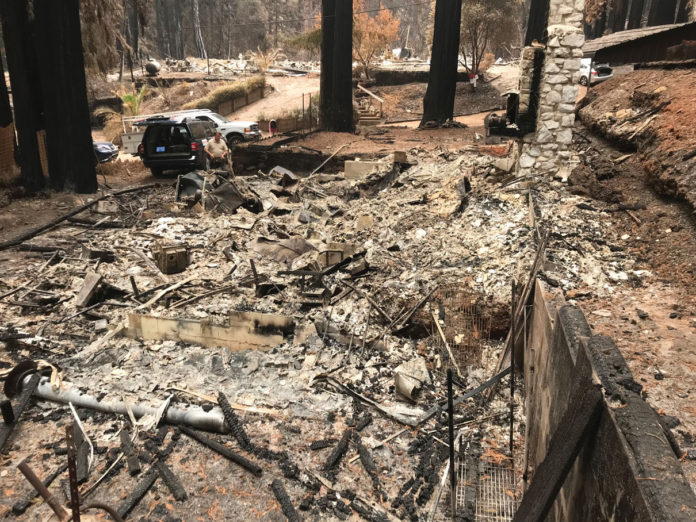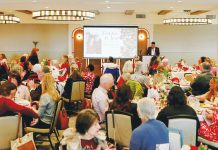
August 2024 marked the four-year anniversary of the CZU Lightning Complex Fire ripping through the Santa Cruz Mountains. Through fundraisers, educational forums and memorial events, residents—including victims of the fire who remain in the area—have gathered to support and assist fellow survivors in their efforts to reclaim and rebuild what was once theirs.
Tracy Walker and her family are one such example of residents desperately in search of assistance—not from their neighbors any longer, but from agencies with whom she and her husband, Justin, have become embattled since losing their family’s Boulder Creek home to the fire.
Since February 2021, the Walkers have maneuvered through a maze of conflicting reports from geotechnical experts and civil engineers, repeated geological studies and sustained denials from a county planning department that cannot see its way clear to aid the Walkers.
The family’s Riverside Grove home was destroyed on Aug. 20. Since then, Walker said she and Justin have endured endless hearings and inspections from the county, and been given ridiculous mandates while trying to rebuild. Although the family now lives in Scotts Valley, they are ready to take the fight to the Santa Cruz County Planning Department and the San Lorenzo Valley Water District (SLVWD), another entity that has made their recovery difficult in the face of so much loss and trauma.
“We’ve been fighting this battle for four years and it’s draining. They absolutely have a vendetta against us,” said Walker, referring to the county.
In a written statement, Walker said, “The county promised an expedited and streamlined rebuilding process. There was nothing that led us to believe it would have been anything different, other than it is widely known that dealing with the Santa Cruz County Planning Department can be extremely difficult.”
Now, the Walkers are suing the county and SLVWD as a result of their actions, and in some cases, inaction.
In the past few years, five of the houses that were lost in the Walkers’ neighborhood have been rebuilt, including their immediate next-door neighbor and those who live across the street. According to Walker, those neighbors signed a rebuild directive, which provided that residents would accept liability and forgo the testing that was being mandated by the county prior to rebuilding.
“We had already done the geological testing on our property, and received reports from six different geologists stating that our property was safe to rebuild. We were out $25,000-$30,000 at that point—had we signed the directive, we would have been throwing that money away,” said Walker, who added that they have all three required pre-clearances to build, but the county is prohibiting them from moving forward because of a water main break in the neighborhood.
“The break did not affect our property, but we’re being told that we have to test the neighbor’s property now in order to rebuild,” Walker said.
Walker noted that the neighbor lives above them, and there was some land movement following the water main break, but the main has broken four times since the fire.
“The district finally turned off the water to that line after the fourth break, but we were prevented from building due to the negligence of the water district,” Walker said.
In July 2023, the county sent the Walkers a notice saying that there would be a notice of geologic hazard assigned to the property, which Walker promptly appealed.
“We only had 20 days from the date of the letter to file our appeal, and because the county didn’t mail it immediately after writing it, we had six days to file our appeal once we received it. We won our appeal because there was no actual evidence of a hazard on our property,” Walker explained. “The two geologists who worked on our case (one assigned by the county and the other privately hired by Walker) both agreed that they needed information from the neighboring property—the one that had suffered the water main break—but that neighbor refused to let geologists onto his land for surveying.”
According to Walker, the neighbor had already rebuilt his house by that time and understandably didn’t want to give the county an excuse to come snooping through his property.
“Without testing the neighbor’s property, there is no way to move forward,” Walker said.
Although the Walkers have been prohibited from rebuilding on their Boulder Creek property, they are still paying taxes on the land.
“Originally, the county said the land had been assessed at approximately $200,000 following the fire,” said Walker, who stated that the most recent letter received from the county assesses the land value at $9,000. “They’re saying it’s a buildable lot valued at that amount—no way in hell is anything buildable in Santa Cruz County worth $9,000.”
The 5,000-square-foot parcel was valued at $150,000 in 2023, according to Walker. The other lots in the Riverside Grove area are still valued in the $100,000-plus range, leaving Walker to wonder why her land was so devalued.
A move like that by the county is referred to as inverse condemnation, which is a way that victims of fires recover their costs after a wildfire. By blocking the Walkers from rebuilding on their parcel and devaluing the land, the county has effectively hamstrung the family from moving forward, leading to the lawsuit filed by Walker.
“We paid for private cleanup and hired two geology firms to help us navigate things. Turns out there was an ancient landslide on the corner of our property that hadn’t moved in thousands of years. After drilling to search for movement indicators, nothing was found, but the county rejected his report, saying that he hadn’t drilled far enough down. Our geologist said that what the county was asking for was absurd,” said Walker, whose chosen geologist has been working in the sector for 35 years.
“He said he’d never been asked to go that far in depth in a report, so he quit the next day,” added Walker, leaving her to wonder why an ancient landslide hadn’t long since been addressed in property records.
After the family’s first geologist abandoned the project, Walker’s lawyer eventually found a new geologist who had a history of working with the county and was able to draw up a report that passed county inspectors, but shortly after that, an atmospheric river hit the area, causing the SLVWD water main to break and thrusting the Walkers back to the starting line. The broken water main is connected to a 380,000-gallon reserve tank, which sits above the Walker’s property and pushes a steady river of water into the ground.
“There is no way that the water main break didn’t contribute to the reassessment of our property as uninhabitable,” Walker said.
Navigating through a phalanx of demands, restrictions and demurrers has taxed the family financially and emotionally. The Walkers, whose insurance paid for their post-fire rental until January 2024, recently purchased a home in Scotts Valley to give their young children a solid foundation.
“It’s been a very high-stress situation for us. It shouldn’t be this way. We lost everything except what we could fit in my car, and it’s been horrible,” said Walker, who became emotional during the conversation. “The new house has given us a little stability, but we’re now hundreds of thousands of dollars in the hole on a property we can’t do anything with.”
On Sept. 16, a hearing was held to determine the viability of complaints against both the county and SLVWD. Both agencies tried to have Walker’s complaints thrown out by filing a demurrer. The judge did not throw out the complaint for the county and is on the fence regarding the complaint against the water district, leaving the Walkers’ attorneys to build another response as to why the case against the water district shouldn’t be dismissed.
Walker believes the next hearing will be held in January 2025, and her hope is that the county settles to provide closure from four years of unmitigated challenges. All she wants, Walker said, is to put this behind her.













Stories like this show why it is so important to elect Chris Bradford to represent our district as supervisor. He is the candidate who will bring change to these corrupt and ossified county agencies.
I think it’s time for a class action suit against the county.